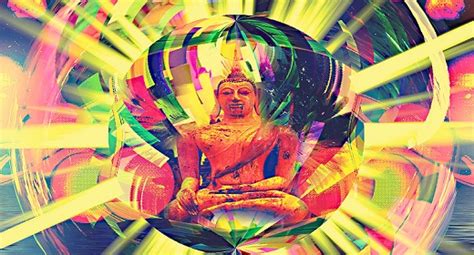Given its transcendental nature and tendency towards openness, many people wonder if Buddhism is congruous with using psilocybin or other mind altering psychedelics. In other words, can using psychedelics enhance meditative states and increase consciousness, or alternatively, can Buddhistic practices, such as meditation, dharma practices, and mindfulness, enhance a psychedelic experience? The answer depends on two factors: who you ask, and, perhaps more importantly, who you are as a person on an intentional level.
Mark Koberg, Executive Director of InsightLA, has a favorable opinion of combining psychedelics and Buddhism practices, stating, “We know that psychedelics are a valid doorway to dharma practice. It was in the 1960s and still is today. And now, there is a renaissance of use.” In his groundbreaking 2018 book, How to Change Your Mind: What the New Science of Psychedelics Teaches Us About Consciousness, Dying, Addiction, Depression, and Transcendence, author Michael Pollan states, “Mushrooms have taught me the interconnectedness of all life-forms and the molecular matrix that we share,” indicating his openness to using psychedelics as a gateway to transcendental spirituality.

There is a rich history in the United States connecting Buddhism and psychedelics. People such as Alan Watts, Jack Kerouac, Aldous Huxley, Allen Ginsberg and Ram Dass were influenced by their experiences with LSD and other psychedelic drugs, an act they used intentionally in tandem with the Eastern spirituality. In fact, American Buddhist guru Jack Kornfield said that LSD, “prepares the mind for Buddhism,” while Allan Watts described both practices as “being part of a comprehensive philosophical quest.”
And anyone who has a modicum of an understanding of Buddhism and the psychedelic experience can see the obvious connection. Both Buddhism and the psychedelic experience dissolve the ego to some degree, thereby expanding our consciousness in such a manner that we feel more connected to people, nature, and the universe. Moreover, both Buddhism and psychedelics allow us to face the inevitably of our own mortality and reach a profound understanding of the lack of permanence of our physical bodies. Jacob Aman, a writer for Synergistic Press and psychedelic advocate, frames it this way:
Both in Buddhism and psychedelic experiences there is a great importance on coming to terms with one’s own mortality and impermanence, on comprehending reality directly rather than theoretically or abstractly, and on understanding the tenuous borders between self and others. We are witnessing a greater acknowledgement of psychedelic use in a spiritual context, and a flowering of books and magazine stories evidence a sharp rise in intellectual interest. All of this is tantamount to a revolution in our understanding of the mind itself, and in the ways that psychedelic interventions may result in evolutionary mental advancement.
Leading the way in this revival of psychedelic-infused Eastern philosophy are our youth. This makes sense given that not only has marijuana become increasingly legalized across the United States, but that it appears psychedelics are following a similar path. Erik Davis, an American writer, scholar, journalist, and public speaker interested in the intersection of mysticism and psychedelic experiences, argues that “We are witnessing a youthquake within Buddhism, a changing of the guard of teachers following the decline of the hippie baby boomers. This new generation of teachers is comfortable with being both Buddhists and consciousness hackers using non-Buddhist means.”
And Vincent Horn, a meditation teacher, also decided to combine the worlds of psychedelics and meditation. Horn found that, “What I noticed in the first trips that I did was that it wasn’t that different from what I’d go through in a meditation period or on retreats where I’m practicing a lot.”
Even modern academia is starting to get on board. Peter Addy from Yale University School of Medicine and founding member of the Yale Psychedelic Science Group has gone on record saying, “Psilocybin can be a gateway into meditation…to show you experiences and to have insight into yourself.”
Still, not everyone is good with this “psychedelic hack” to consciousness. Chief among them is the Dali Lama, considered to be Bodhisattva by Tibetan Buddhist. Although the Dali Lama does not come out explicitly against the use of psychedelics as an avenue to transcendence, he warns about the temporality of this approach: “Scientists are coming to recognise the effects of the mind on physical health. The sense of relaxation associated with inner peace involves not only being physically at ease. If you are nagged by worry or seething with anger, you’re not really relaxed. The key to relaxation is peace of mind. The relaxation gained from alcohol, drugs or just listening to music may seem attractive, but it doesn’t last.”
Other people are also skeptical. The researchers Michael Lerner and Michael Lyvers conducted a study titled Values and beliefs of psychedelic drug users: a cross-cultural study, which examined if transcendental experiences associated with psychedelics were enduring or temporary. And though many subjects reported positive experiences that substantially informed their life paths, Scott A. McGreal MSc., writes that Lerner and Lyvers also have a cautious attitude:
On the other hand, it might be tempting to expect too much from psychedelic drugs. Lerner and Lyvers noted that they were expecting that psychedelic drug users might cope better with stress than non-drug users because they believed that mystical and spiritual experiences would act as a buffer against stressful events. On the contrary, they found that psychedelic drug users did not differ from non-drug users in their self-reported ability to cope with stress.
At the end of the day, each person is different, so psychedelics could be an enhancement, or a distraction from the path toward some type of spiritual enlightenment. One thing to keep in mind, if you pardon the meditative pun, is your intention behind using psychedelics.
As Matteo Pistono, a writer and meditation teacher so eloquently puts it, “Intention and caution are two hallmarks of the contemporary flowering of psychedelic use among Buddhists. Recreationally tripping on mushrooms or LSD at a Phish show is not to be confused with dharma practice. Instead, as one Zen teacher from Washington said, ‘We take these substances, which we consider medicine, as a kind of sacrament, with aspirations of healing ourselves so that we can more effectively be of service throughout the world.”
At Newsweed.com, we adhere to three simple principles: truth, balance, and relatability. Our articles, podcasts, and videos strive to present content in an accurate, fair, yet compelling and timely manner. We avoid pushing personal or ideological agendas because our only agenda is creating quality content for our audience, whom we are here to serve. That is why our motto is ”Rolling with the times, straining for the truth.”
Your opinion matters. Please share your thoughts in our survey so that Newsweed can better serve you.
Charles Bukowski, the Los Angeles beat poet that captured the depravity of American urban life once said, “There is something about writing poetry that brings a man close to the cliff’s edge.” Newsweed is proud to stand in solidarity and offer you a chance to get close to the cliff’s edge with our first Power of Poetry Contest. Are you a budding bard, a versatile versifier, a rhyming regaler? Do you march to the beat of iambic pentameter, or flow like a river with free verse? If so, here’s your opportunity to put your mad poetic chops to the test. Enter our poetry contest for bragging rights and an opportunity to win some cash!






